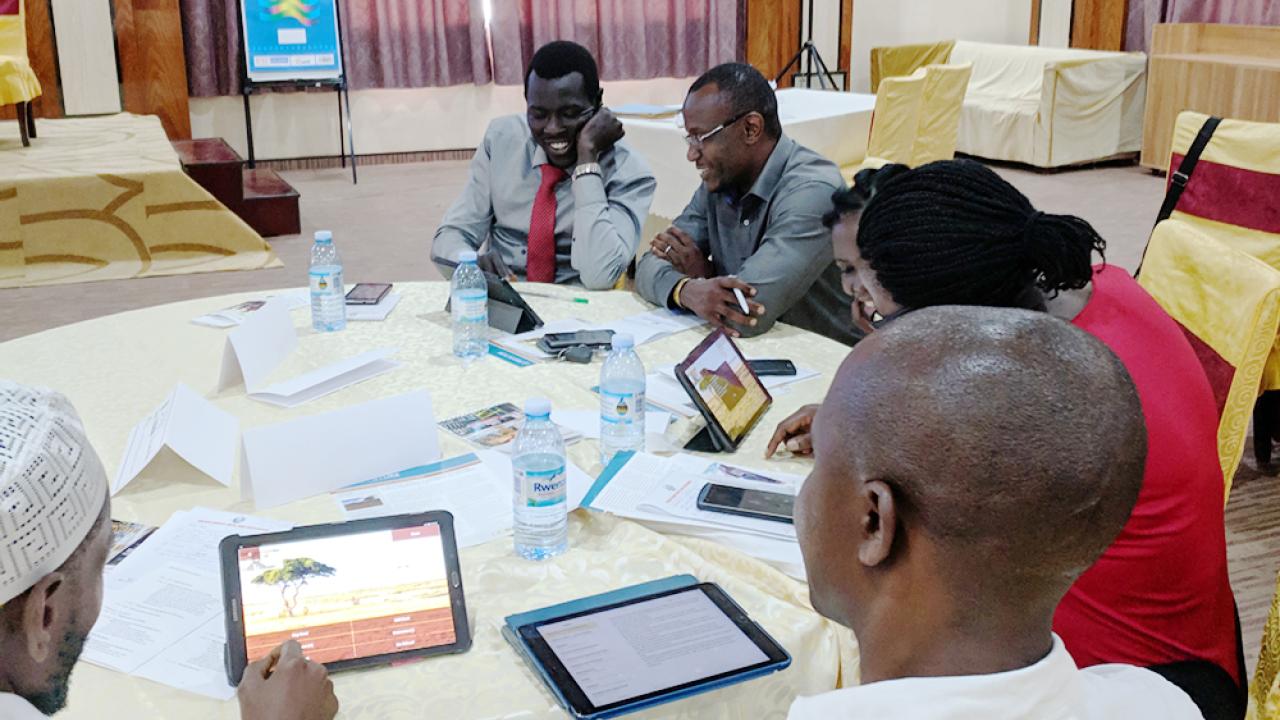
Uganda Builds Capacity on Index Insurance to Expand National Program
At the Uganda Ministry of Finance, Planning and Economic Development (MOFPED) in February, 85 representatives from government, USAID, GIZ, international NGOs, banks and insurance companies had difficult choices to make about their small herds of goats.
Intentionally, not everyone was given equal footing. With a severe drought scheduled, some had high-quality index insurance that reliably paid out for lost goats. Others had insurance that paid out unpredictably or had no insurance at all. When drought struck, those three groups landed in vastly different circumstances.
“A lot of people were unable to feed their families,” said AMA Innovation Lab director Michael Carter.
The experience with SimPastoralist, a tablet-based game to teach about index insurance, was only a small part of the February 14-15, 2019 conference hosted in Uganda by the MOFPED and the AMA Innovation Lab. The event convened researchers as well as regional experts on agricultural insurance implementation and policy for to add to work already underway in Uganda.
Improving Index Insurance Quality for Small-scale Farmers
Impact evaluations have shown that high-quality index insurance protects farmers from drought while also promoting investments in higher productivity. Because index-based insurance does not require the verification of losses, it can also be offered much more cheaply than conventional insurance.
“At the event people got really excited about the idea of index insurance based on impact studies from around the world,” said Carter. “People also started thinking about the quality issue.”
Carter’s goals at the event were to provide evidence on the potential impacts of index insurance, to bring in experts who had implemented index insurance in nearby countries and to show just how much product quality matters. SimPastoralist, created by UC Davis Ph.D. candidate Andrew Hobbs, was tailored for the event to demonstrate just how much quality matters.
The event also included a demonstration of the AMA Innovation Lab’s Minimum Quality Standard (MQS) for index insurance, which Carter developed. It is the only existing objective measure of index insurance quality. MQS is also the starting point for a collaborative initiative between USAID, UC Davis and RCMRD in Kenya to establish Quality Index Insurance Certification (QUIIC) for East Africa.
“Quality is something that is often overlooked as people struggle to implement a product,” says Carter.
Proactive Social Protection in Uganda
The Government of Uganda piloted its Uganda Agricultural Insurance Scheme (UAIS) in 2016. In 2017, the country faced a severe drought that put small-scale farmers at risk of losing their crops. UAIS paid out about $1.2 million in claims, according to Munyaradzi Daka, technical manager of the Agricultural Insurance Consortium of the Uganda Insurers Association.
In 2019, the Government of Uganda plans to launch the National Agriculture Insurance Scheme, which will provide participating insurance companies subsidies to promote and provide agricultural insurance to both small- and large-scale farmers. It will also provide subsidies to cover part of the cost of insurance premiums for farmers. Right now, UAIS covers about 60,000 farmers with index-based insurance, according to Daka.
“The opportunities are massive if we keep giving the right product,” said Daka.
Media contact:
Alex Russell, (530) 752-4798, parussell@ucdavis.edu
